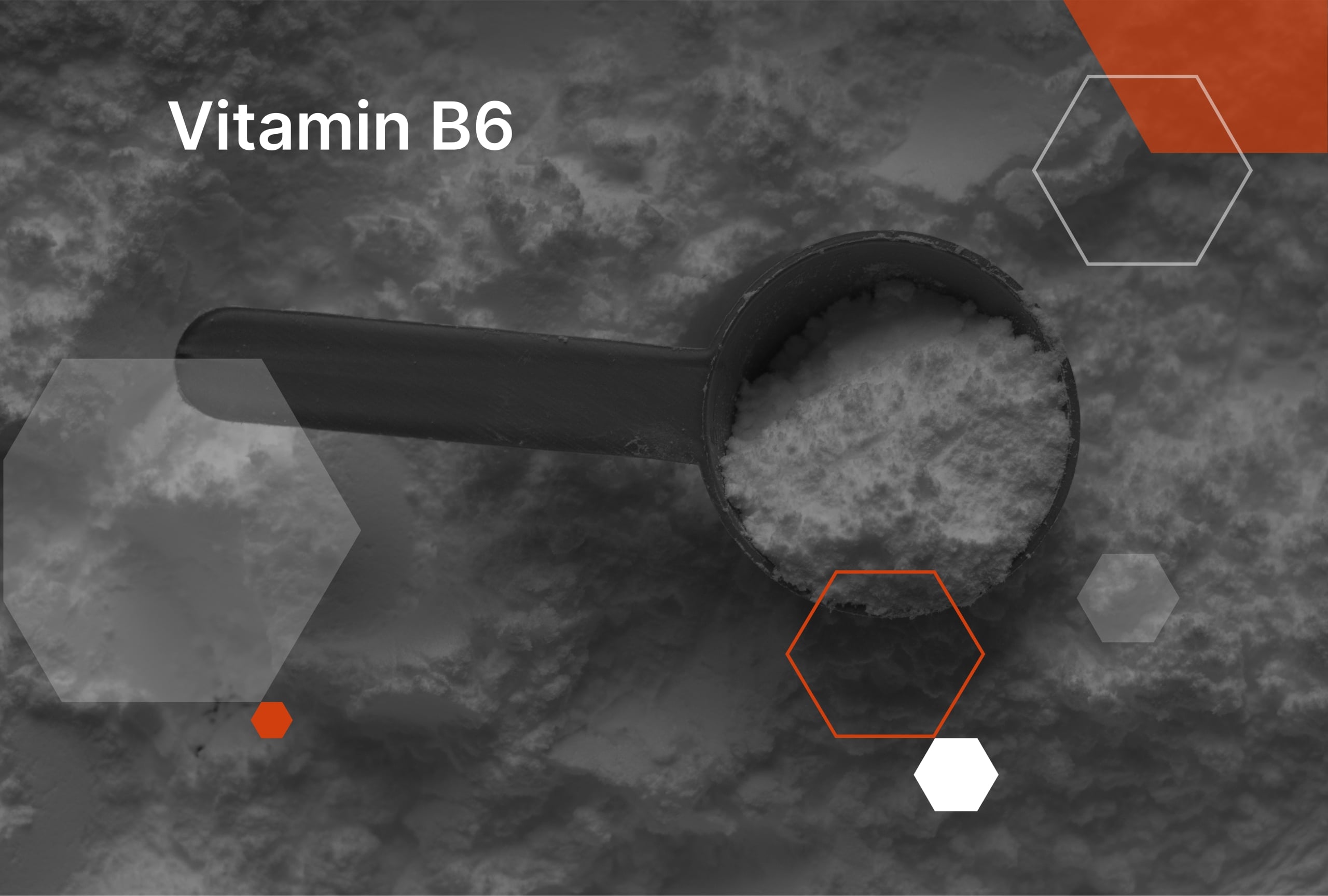Kemiex is an all-in-one market information, purchasing and sales platform for animal and human nutrition raw materials. In the following series of articles, we will explain the functions and uses of products that can be found in the Kemiex marketplace. On this occasion, we are going to explain the benefits of Vitamin B6 or Pyridoxine:
What is Vitamin B6 used for?
Vitamin B6, also known as Pyridoxine, is a water-soluble vitamin that is essential for a variety of physiological processes in the body. It is involved in the production of neurotransmitters, such as serotonin and norepinephrine, and is also involved in the synthesis of hormones and red blood cells.
What are the main benefits of Vitamin B6?
Some of the key uses and benefits of Vitamin B6 include:
1. Supports neurotransmitter synthesis:
Vitamin B6 is involved in the synthesis of neurotransmitters, such as serotonin and norepinephrine, which play a role in regulating mood, sleep, and appetite.
2. Helps produce red blood cells:
Vitamin B6 plays a role in the production of hemoglobin, a protein found in red blood cells that carries oxygen to the body’s tissues.
3. Supports immune system function:
Vitamin B6 is important for maintaining a healthy immune system and has been shown to improve the response to infections.
4. Regulates blood sugar levels:
Vitamin B6 helps to regulate blood sugar levels by supporting the metabolism of carbohydrates, which can be especially beneficial for individuals with diabetes.
5. Supports healthy skin, eyes, and nerves:
Vitamin B6 is involved in the maintenance of healthy skin, eyes, and nerves, and it may help to prevent or reduce symptoms of conditions such as dermatitis and neuropathy. Additionally, Vitamin B6 has been shown to improve cognitive function in some individuals.
Which foods are the main sources of Vitamin B6?
Vitamin B6, or Pyridoxine, can be found in a variety of foods, making it easy to get enough of this important nutrient through diet. Some of the best food sources of Vitamin B6 include:
1. Chickpeas: One cup of cooked chickpeas provides over 1 mg of Vitamin B6.
2. Tuna: Tuna is a rich source of Vitamin B6, with a 3-ounce serving providing approximately 0.9 mg.
3. Salmon: Salmon is a good source of Vitamin B6, with a 3-ounce serving providing approximately 0.5 mg.
4. Pork: Pork is a rich source of Vitamin B6, with a 3-ounce serving providing approximately 0.5 mg.
5. Turkey: Turkey is a good source of Vitamin B6, with a 3-ounce serving providing approximately 0.5 mg.
6. Beef: Beef is a rich source of Vitamin B6, with a 3-ounce serving providing approximately 0.5 mg.
7. Potatoes: One medium baked potato provides approximately 0.5 mg of Vitamin B6.
8. Bananas: One medium banana provides approximately 0.4 mg of Vitamin B6.
9. Spinach: One cup of cooked spinach provides approximately 0.4 mg of Vitamin B6.
10. Bell peppers: One medium red bell pepper provides approximately 0.3 mg of Vitamin B6.
It’s important to note that these are approximate values and may vary based on specific food preparation methods and portion sizes.
Recommended daily intake (RDI) of Vitamin B6
The recommended daily intake (RDI) of Vitamin B6, also known as Pyridoxine, varies based on age and gender. According to the National Institutes of Health (NIH), the following are the RDIs for Pyridoxine:
-
Men: 1.3 milligrams (mg)
-
Women: 1.2 milligrams (mg)
-
Pregnant women: 1.9 milligrams (mg)
-
Breastfeeding women: 2.0 milligrams (mg)
What are the main benefits of Vitamin B6 or Pyridoxine for animals?
Vitamin B6, also known as Pyridoxine, plays a crucial role in the growth and development of animals. Some of the main benefits of Vitamin B6 for animals include:
1. Support of the nervous system: Vitamin B6 is important for the development and functioning of the nervous system in animals. It helps in the production of neurotransmitters, which are responsible for transmitting signals in the nervous system.
2. Maintenance of red blood cells: Vitamin B6 helps in the production of hemoglobin, which is essential for the transport of oxygen in the blood.
3. Immune system support: Vitamin B6 helps in maintaining the health of the immune system in animals. It is involved in the production of antibodies and other immune system components.
4. Metabolism regulation: Vitamin B6 helps in the regulation of metabolic processes in animals, such as the metabolism of proteins, carbohydrates, and fats.
5. Healthy skin and coat: Vitamin B6 is important for the maintenance of healthy skin and coat in animals. It helps in the production of keratin, which is a protein that provides structure to the skin and fur.
Some food sources of Vitamin B6 for animals include poultry, fish, meat, eggs, dairy products, and fortified cereals. It is also available in supplement form for animals.
Where to buy bulk Vitamin B6 and get market information?
In Kemiex, we offer a safe and private online environment to buy and sell raw materials for the Feed, Food, Veterinary, and other life science industries. We also offer market information such as Price Trends, Trade Flows and Market News for all the micro-ingredients of the mentioned industries.
